|
|
|
Sort Order |
|
|
|
Items / Page
|
|
|
|
|
|
|
| Srl | Item |
| 1 |
ID:
142466
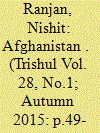

|
|
|
| 2 |
ID:
169808
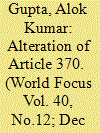

|
|
|
|
|
| Summary/Abstract |
Imran Khan the Prime Minister of Pakistan was flying high and had developed a tinge of aggressiveness in his diplomatic offensives after Trump’s offer of ‘mediation’ on Jammu and Kashmir (J&K), where Donald Trump, the American President allegedly also quoted Narendra Modi, the Prime Minister of India that he too has asked for mediation. While the Trump’s statement led to a furore in India, Imran in Pakistan started preparing ground for securing international backing on Kashmir. However, he never anticipated that Modi’s Government would drop a ‘bombshell’ by rendering Articles 370 and 35A infructuous. Pakistan used this as an opportunity in connivance with China to take the issue to the United States Security Council (UNSC).
|
|
|
|
|
|
|
|
|
|
|
|
|
|
|
|
| 3 |
ID:
127343
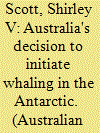

|
|
|
|
|
| Publication |
2014.
|
| Summary/Abstract |
On May 31, 2010, Australia instituted proceedings before the International Court of Justice in the case of Whaling in the Antarctic (Australia v. Japan). Although Australian politicians had for some time threatened such a course of action, the decision to proceed with international litigation took many observers by surprise, most basically because Japan appeared to be in a strong legal position and the risks associated with the case appeared greater than Australia's prospects for success. This article examines the background to the whaling dispute and suggests two ways in which litigation in the World Court may contribute to resolution of the dispute no matter the legal outcome of the case.
|
|
|
|
|
|
|
|
|
|
|
|
|
|
|
|
| 4 |
ID:
133937
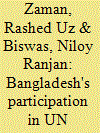

|
|
|
|
|
| Publication |
2014.
|
| Summary/Abstract |
This article argues that the participation of the Bangladeshi armed forces in UN peacekeeping has produced positive benefits for civil-military relations in the country and that this process is best explained by reference to concordance theory, as propagated by Rebecca Schiff. Unlike traditional theories of civil-military relations, concordance theory highlights dialogue, accommodation and shared values or objectives held by the military, the political elites and society. We argue in this paper that peacekeeping has gradually emerged in Bangladesh as an issue where all three partners are converging and prone to hold similar views. This may have a profound impact upon Bangladeshi politics whereby the chances of military intervention in domestic politics will lessen. This paper helps in understanding the implications of Bangladesh's involvement in UN peace missions, an issue on which little work has been conducted until now despite the fact that it has important implications for both the Bangladesh state and its armed forces.
|
|
|
|
|
|
|
|
|
|
|
|
|
|
|
|
| 5 |
ID:
180284
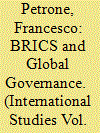

|
|
|
|
|
| Summary/Abstract |
This article analyses the role played by the Brazil, Russia, India, China and South Africa (BRICS) countries within the context of the reform of international institutions, in primis the United Nations Security Council (UNSC). In recent years, the new emerging powers, among which the BRICS occupy a central position, have instigated a paradigm shift in international relations and global governance (GG). Furthermore, some scholars argue that the BRICS could inaugurate a new world order. Since the United Nations (UN) is one of the institutions in which these changes need to be more broadly reflected due to its global projection, it is doubtful if the BRICS will be able to bring about its reform. In fact, several debates were conducted about the need to reform the UN and, in particular, the Security Council (SC). In order to do this, the article examines the interests of the BRICS countries, within the group itself, and their vision for the UNSC. Only a common vision within the group could have specific effects in reforming the UNSC, thus giving a new shape to GG, which may not be possible. There are several obstacles from within the BRICS itself in this regard, despite the fact that during their summits, they have repeatedly called for the UN reforms.
|
|
|
|
|
|
|
|
|
|
|
|
|
|
|
|
| 6 |
ID:
138320
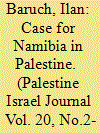

|
|
|
|
|
| Summary/Abstract |
In March 2006 I was received by President Hifikepunye Pohamba of Namibia, as the ambassador designate of Israel to that country, in his official residence in the capital city Windhoek. The tall and elegant man with a captivating beaming smile warmly received my letter of accreditation. According to protocol we sat for a short conversation. This was the opportunity for him to set the rules for our future relations.
|
|
|
|
|
|
|
|
|
|
|
|
|
|
|
|
| 7 |
ID:
107098
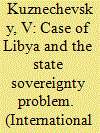

|
|
|
|
|
| Publication |
2011.
|
| Summary/Abstract |
CONCERNED WITH THE FLARE-UPS of popular revolutions in North Africa and the Middle East in March and April and the events in the Libyan Arab Jamahiriya, in the first place, the world community turned its gaze at the United Nations and its role in conflict settlement. The public and the UNSC tried to outline the limits beyond which no international interference in domestic policies was acceptable. In short, the world community wanted to know how state sovereignties could be preserved in the contemporary world; in fact, the future of the Westphalian principles is at stake. The Libyan crisis was unfolding to the accompaniment of the media deliberations, in Russia and the West, that the Westphalian principles should be abandoned. Nikolai Zlobin, a Russian migr living in the United States, Director of Russian and Asian Programs at the Washington-based World Security Institute, published in Rossiiskaia gazeta, the newspaper of the RF government, a long article called "Konets suverenitetov" (The End of Sovereignties). He has come close to admitting that the international law based on the Westphalian principles is a thing of the past. "The tragedy in Japan or, for example, in Libya has shown that the national sovereignty cannot be protected any longer," he writes. In the 21st century, he goes on to say, "the priority of national sovereignty per se vs. the world community's basic interests can no longer be preserved; the same applies to the principle of non-interference in domestic affairs and inadmissibility of ensuring safety of a country, region or people by external forces; otherwise the world community will have to pay dearly. At least this is how I see it from Washington.
|
|
|
|
|
|
|
|
|
|
|
|
|
|
|
|
| 8 |
ID:
137185
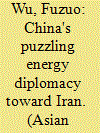

|
|
|
|
|
| Summary/Abstract |
China, the world's largest energy consumer, has sought to build up its ties with all energy-rich countries. But China's energy diplomacy toward Iran, one of its largest oil suppliers, is puzzling. On the one hand, China has gone all out to strengthen its ties with Iran in spite of international efforts to isolate Iran because of its controversial nuclear program. On the other hand, China not only has voted against Iran at the International Atomic Energy Agency and the United Nations Security Council on the nuclear issue, but also has cut its oil imports from Iran. The main explanation for this apparent contradiction is US pressure. China has yielded to the pressure because the United States and its allies are much more important for China's economic development and energy security than is Iran.
|
|
|
|
|
|
|
|
|
|
|
|
|
|
|
|
| 9 |
ID:
160986
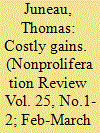

|
|
|
|
|
| Summary/Abstract |
Iran’s nuclear ambitions have been at the center of Middle Eastern politics and a global nonproliferation source of concern for almost twenty years. Much has been written on the topic, but one important question has received less attention: was it beneficial for the Islamic Republic? How have the gains and losses associated with its nuclear pursuits compared with each other? This article attempts to provide a comprehensive assessment of the costs and benefits of Iran’s nuclear program. We start with an overview of the literature on why states pursue nuclear programs. This allows us to build a list of objectives that states can hope to achieve through their nuclear ambitions. We use these as yardsticks to assess the gains Iran has reaped and the losses it has incurred. This leads to the conclusion that, although Iran has earned some benefits from its nuclear program, these have been costly; ultimately, the costs have exceeded the benefits. We conclude by reflecting on what the Iranian case tells us more broadly about the study of nuclear proliferation.
|
|
|
|
|
|
|
|
|
|
|
|
|
|
|
|
| 10 |
ID:
053018
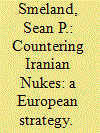

|
|
|
| 11 |
ID:
124516
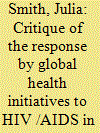

|
|
|
|
|
| Publication |
2013.
|
| Summary/Abstract |
This article provides a critical perspective on global health initiatives (GHIs) in response to HIV/AIDS in post-conflict African countries. Focusing on the Global Fund to Fight HIV/AIDS, Tuberculosis and Malaria, the President's Emergency Plan for AIDS Relief and UN bodies, it argues that many global health initiatives lack consideration of the complexities of addressing HIV/AIDS in post-conflict contexts. It finds that prevention programmes fail to prioritize the population groups who are at high risk; that treatment and care interventions are shaped by an emergency aid paradigm, which does not ensure ongoing well-being for people living with HIV/AIDS; and that global health initiatives often impede the capacity of local governance and health systems. Given that global health initiatives have yet to fully engage with the challenges of implementing HIV/AIDS interventions in conflict-affected African contexts, the article concludes by proposing recommendations in this regard.
|
|
|
|
|
|
|
|
|
|
|
|
|
|
|
|
| 12 |
ID:
142339
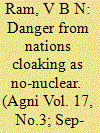

|
|
|
| 13 |
ID:
111755
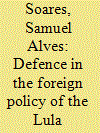

|
|
|
| 14 |
ID:
139367
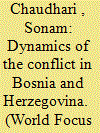

|
|
|
|
|
| Summary/Abstract |
Due to the changing nature of Conflict, establishment of internal security in post conflict societies is a major challenge for the international players. The Bosnian conflict has played a very important role in the international security scenario. It provided the chance to the international actors to show their peacekeeping and conflict management capacity in a war situation.
|
|
|
|
|
|
|
|
|
|
|
|
|
|
|
|
| 15 |
ID:
144959
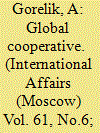

|
|
|
|
|
| Summary/Abstract |
Its numerous trump cards, on the other hand, allow this global organization to claim the role of an instrument to be used to improve life on Earth. This claim stems from its legitimacy and moral authority that rests on its unique Charter (the backbone of international law), a vast intellectual luggage, a wide sphere of interests and competences, and its ability to attack the hardest problems and talk as an equal to world powers.
|
|
|
|
|
|
|
|
|
|
|
|
|
|
|
|
| 16 |
ID:
138327
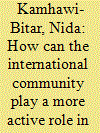

|
|
|
| 17 |
ID:
149696
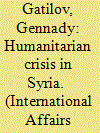

|
|
|
|
|
| Summary/Abstract |
THE HUMANITARIAN CRISIS in the Syrian Arab Republic, which has resulted from a protracted civil conflict in that country, can be described as the most wide-ranging in modern history. Here are just a few figures standing behind which are human lives and fates.
|
|
|
|
|
|
|
|
|
|
|
|
|
|
|
|
| 18 |
ID:
187525
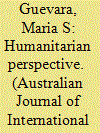

|
|
|
|
|
| Summary/Abstract |
As part of the ‘UN Security Council and Health Emergencies’ collection, this article provides the humanitarian perspective in the collection. Over the last two decades, the UN Security Council has come to play an increasingly prominent role in global responses to health emergencies—including in COVID-19. In this article, scholars from International Relations, Public Health, International Law and humanitarian aid organisations reflect on this developing role, and the consequences (both positive and negative) for global health security efforts. From the humanitarian perspective, the nexus of health and security has become a war on words and a double-edged sword. The article highlights the difference between the ‘securitisation’ of health and securing health, where the latter is what is truly needed in ensuring health for all. It does so by bringing out examples of real field impact and challenges humanitarian actors face when narratives are manipulated as such and what role the UNSC can and should play in allaying negative repercussions.
|
|
|
|
|
|
|
|
|
|
|
|
|
|
|
|
| 19 |
ID:
128082
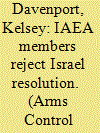

|
|
|
|
|
| Publication |
2013.
|
| Summary/Abstract |
A resolution critical of Israel's nuclear program, revived after a two-year hiatus, failed to pass the General Conference of the International Atomic Energy Agency (IAEA) last month. The nonbinding resolution, sponsored by a group of 18 Arab states, would have called on Israel to join the nuclear Nonproliferation Treaty (NPT) as a non-nuclear-weapon state and put all of its nuclear sites under comprehensive IAEA safeguards. The measure, referred to as "Israeli Nuclear Capabilities" on the IAEA agenda, failed by a vote of 43-51 on Sept. 20, the last day of the conference.
|
|
|
|
|
|
|
|
|
|
|
|
|
|
|
|
| 20 |
ID:
176052
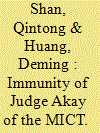

|
|
|
|
|
| Summary/Abstract |
On 5 October 2016, the President of the UN Residual Mechanism for International Criminal Tribunals officially notified the United Nations Security Council of the failure of the Republic of Turkey to comply with a judicial order issued by the Mechanism which requested the authorities of Turkey to cease all legal proceedings against the MICT Judge Aydin Akay due to his immunity. This paper aims to examine issues pertinent to the immunity of an international judge arising from this situation. It also seeks to explore the conflicts behind the arrest of Judge Akay and draw some conclusions.
|
|
|
|
|
|
|
|
|
|
|
|
|
|
|
|
|
|
|
|
|